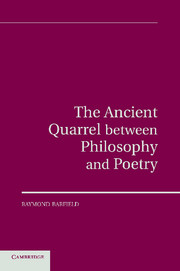Book contents
- Frontmatter
- Contents
- Acknowledgments
- Introduction
- 1 Socrates, Plato, and the Invention of the Ancient Quarrel
- 2 Aristotle, Poetry, and Ethics
- 3 Plotinus, Augustine, and Strange Sweetness
- 4 Boethius, Dionysius, and the Forms
- 5 Thomas and Some Thomists
- 6 Vico's New Science
- 7 Kant and His Students on the Genius of Nature
- 8 Hegel and the Owl of Minerva
- 9 Kierkegaard: A Poet, Alas
- 10 Dilthey: Poetry and the Escape from Metaphysics
- 11 Nietzsche, Heidegger, and the Saving Power of Poetry
- 12 Mikhail Bakhtin and Novelistic Consciousness
- Index
- References
5 - Thomas and Some Thomists
Published online by Cambridge University Press: 03 May 2011
- Frontmatter
- Contents
- Acknowledgments
- Introduction
- 1 Socrates, Plato, and the Invention of the Ancient Quarrel
- 2 Aristotle, Poetry, and Ethics
- 3 Plotinus, Augustine, and Strange Sweetness
- 4 Boethius, Dionysius, and the Forms
- 5 Thomas and Some Thomists
- 6 Vico's New Science
- 7 Kant and His Students on the Genius of Nature
- 8 Hegel and the Owl of Minerva
- 9 Kierkegaard: A Poet, Alas
- 10 Dilthey: Poetry and the Escape from Metaphysics
- 11 Nietzsche, Heidegger, and the Saving Power of Poetry
- 12 Mikhail Bakhtin and Novelistic Consciousness
- Index
- References
Summary
Writing about Thomas Aquinas, G. K. Chesterton says, “He very specially possessed the philosophy that inspires poetry, as he did so largely inspire Dante's poetry.” Aquinas was a trained poet. In Naples he studied the art, rules, and methods of rhythmic composition. He wrote Office of the Blessed Sacrament, which is counted among the finest pieces of medieval literature. Thomas thoroughly understood what the poets were doing, thought the role of speaking for God was important, and allowed in several places that the pagans had been used to speak for the Divine. He also thought revelation had advanced beyond the pagans, and for him the division of labor was clear. Words from God come through revelation, through the prophets who experience something beyond their own capacity, at times even through “rapture,” a concept very close to the theia mania of the poets in the Phaedrus but trustworthy because of reasons Aquinas gives us in his treatises on prophecy, rapture, and contemplation. It is the Christian thinker (philosopher/theologian) who can judge the pagans and listen for God's voice. In the case of the prophets of God, the philosopher is bound to listen to the whole as delivered by God and, as it were, make sense. Among the pagans, however, the philosopher can dismiss more inconvenient statements that complicate the effort to “make sense.”
Aquinas was not one to put great stock in flashes of insight. What Aquinas wanted was not flash, beauty, or surprise.
- Type
- Chapter
- Information
- The Ancient Quarrel Between Philosophy and Poetry , pp. 106 - 124Publisher: Cambridge University PressPrint publication year: 2011



